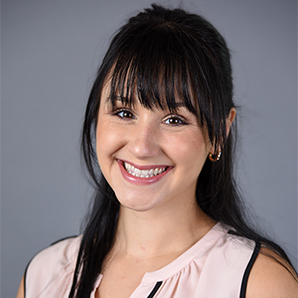Why did you choose graduate school at IUPUI?
I chose IUPUI for the collaborative, cooperative atmosphere and cutting-edge research opportunities available. I felt that IUPUI would provide me with the best education and opportunities during my PhD.
What has been your favorite academic accomplishment since you’ve been here?
My favorite academic accomplish has been winning the Greater Indiana Society for Neuroscience Research Image Contest in 2022. I love microscopy, so it was great to share one of my favorite images with others at this meeting.
What do you enjoy most about life in Indianapolis?
I really enjoy spending time outdoors in Indianapolis - I truly love the weather here. During my free time outside of the lab, I can most often be found running on the Monon Trail, hiking, or participating in other outdoor activities.
Please provide some details about your work/research as a graduate student and/or any activities you are involved in.
My research is centered upon uncovering the role of Ref-1 in retinal neovascularization. Retinal neovascularization impairs visual function in millions of people worldwide. Current treatments include intravitreal (IVT) injections of anti-vascular endothelial growth factor (VEGF) biologics. However, these therapeutics are often accompanied by high treatment burden and resistance to therapy. Previous research indicates that VEGF alone is not sufficient for induction of neovascularization, suggesting that multiple disease-relevant pathways may be targeted to increase therapeutic response. Thus, there is a critical need to develop novel therapies that modulate multiple disease-relevant pathways and circumvent the issues with IVT injections. Prior studies indicate that Ref-1 regulates multiple transcription factors that are linked to retinal neovascularization. But, the underlying molecular mechanisms of the Ref-1 target in retinal neovascularization have yet to be elucidated. Identifying the molecular mechanism underlying Ref-1 in retinal neovascularization is critical in developing novel therapies to reduce vision loss.
Aside from research, I am actively involved in the SNRI Women in Neuroscience committee and am currently serving on the Stark Summer Symposium Organization committee. I also spend time engaging with and educating the public through social media platforms to help make science more accessible to a broader audience.


